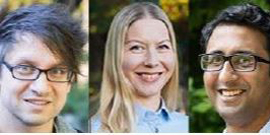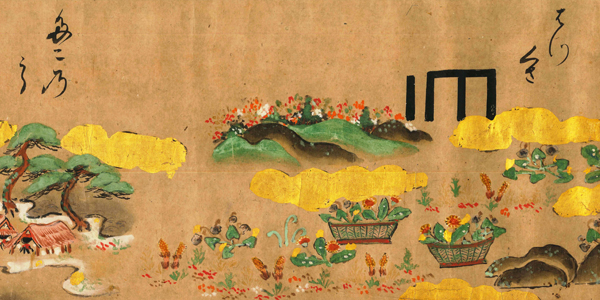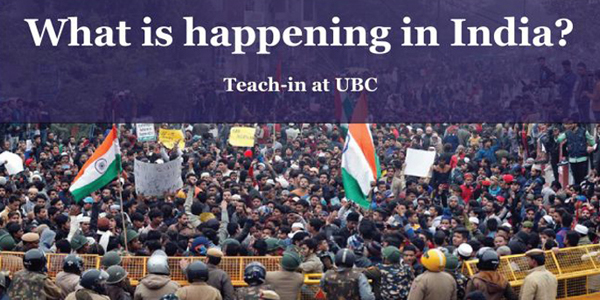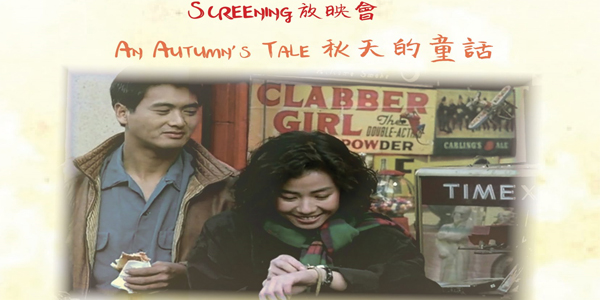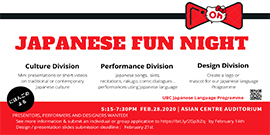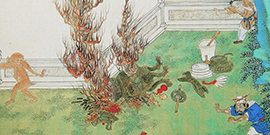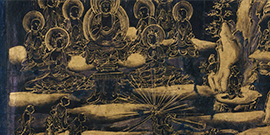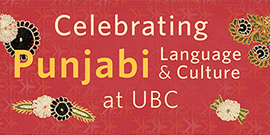
February 04, 2020 The Update is a bi-weekly roundup of news in the Department of Asian Studies for our Students, Faculty and Staff |
|
||||||
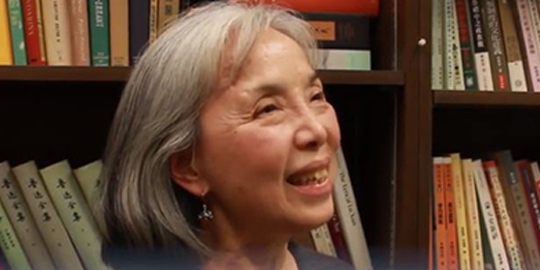 |
||||||
|
Josephine Chiu-Duke promoted to Full Professor We congratulate Dr. Josephine Chiu-Duke in our Chinese faculty on her recent promotion! Specialising in traditional Chinese social, intellectual and cultural history, as well as twentieth-century Chinese fiction, Dr. Chiu-Duke is currently teaching Chinese Political Thought and Institutions, History and Culture of Taiwan, and Classical Chinese (Heritage). |
||||||
|
||||||
| DEPARTMENT EVENTS | ||||||||||||||||||
|
|
||||||||||||||||||
 |
||||||||||||||||||
|
2019/20 John Howes Lecture in Japanese Studies Professor Ketelaar will draw on his most recent research into the concepts of the barbarian and the frontier in the construction of Japanese national identity and history; coupled with this he will examine something of the roles and meanings of emotion in the construction of the historical imagination in Japan. All of which will be used in a critical approach to the area known as Japan Studies. |
||||||||||||||||||
|
||||||||||||||||||
|
||||||||||||||||||
| EVENT RECAP |
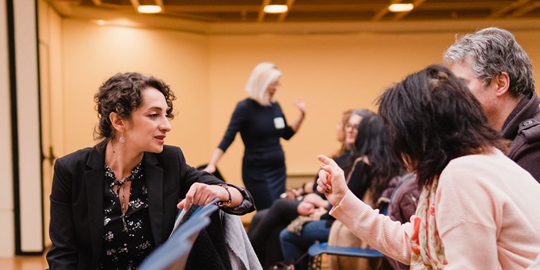 |
|
Cinema and the City Film and Urban Iran in the Early 20th Century - Friday, January 17 Thank you to all who attended this event on the recognition and appraisal of Iranian cinema. Click here to see some photos from the evening and here to listen to the audio! |
| Alumni Spotlight - Verna Yam |
|
Interested in what you can do with a degree in Asian Studies? In our Alumni Spotlight Interview Series, we ask our alumni about their career paths, how they became interested in Asian Studies and for any advice they would give to current students. This interview features Chandima Silva (BA 2018). Chandima is currently managing the delivery of Computing Science graduate programs at SFU, and is also Director of Arts and Culture at the Asia Pacific Youth Council for 2019-20. |
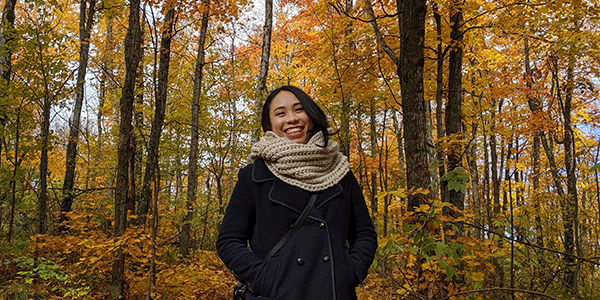 |
|
Could you elaborate on an experience that you felt was fundamental in your acquisition of the language or appreciation of the culture? Participating in UBC tandem Language Learning Program reinforced my Mandarin speaking skills. I was taking UBC Chinese language courses at the time, but tandem provided valuable support as it offered the chance to practice oral Mandarin on a one-on-one basis. My tandem partner also shared personal experiences that gave me a better understanding of Chinese society. Language acquisition aside, it was just generally wonderful to chat with and learn about a fellow UBC student who I would otherwise likely have never encountered. Is your current career path as you originally intended? What challenges did you face in launching your career? I’m lucky that as I pursue my interest in international relations, I continually receive affirmation that this is the general field that I want to be in. My areas of interest have drastically evolved though. I changed my geographic focus to Asia and I developed an interest in climate change. When I notice that I am leaning towards certain areas, I take note and try to use upcoming opportunities (e.g. writing a term paper) to immerse myself in the topic and confirm my interest. The opportunities that didn’t seem like a good fit for my interests were challenges along my career path, but they also turned out to be opportunities to develop my career. For instance, throughout my time at UBC, I never got the co-op jobs that I wanted in Global Affairs Canada. However, the positions that I got at Environment and Climate Change Canada sparked my interest in climate change. Even now, my current trade policy job is a far cry from the international climate change cooperation that I hope to eventually to work on. I also don’t work on China, which is what I focussed on throughout school. Still, working on a dimension of Canada’s foreign policy with Asia is a fantastic start to my career. I am confident that I am developing relevant skills for future positions and I constantly seek opportunities to enhance my understanding of my interest areas. With the support of my team, I am also able to bring some of my interests to my job. What advice would you give to students and alumni interested in breaking into your industry? If you are looking to work on Canadian foreign policy, consider looking for positions in Ottawa. Provincial governments may have international relations-related policy jobs, but there may be more jobs available within federal government since the federal government has jurisdiction over Canada’s foreign affairs. Also, I recommend looking at departments other than Global Affairs Canada for jobs in international affairs. While Global Affairs Canada is the main department in charge of Canada’s foreign affairs, each department has work with an international dimension, and thus have positions related to international affairs too. Even if you aim to work for Global Affairs Canada eventually, experience in other departments can be valuable as it provides insight into how other departments operate and contribute to Canada’s foreign policy. |
| OPPORTUNITIES |
 |
|
2020 APU Summer Gateway Program The Gateway Program offers intensive Japanese language courses from beginner to intermediate level. APU’s multicultural environment, which cannot be found elsewhere in Japan, provides a friendly and safe environment for students who do not have any background in Japanese. You will not only expand your knowledge of Japanese and Asia Pacific cultures, but also deepen your intercultural understanding and cross-cultural communication skills by studying alongside students from over 90 countries and regions. Critical Asian Studies Journal's Online Blog Critical Asian Studies, a Taylor and Francis multidisciplinary academic journal, is soliciting 500-1,500-word online blog posts to for a linguistically and culturally diverse readership. With a focus on practice more than theory, the blog is now publishing posts emphasizing empirical evidence from early career scholars about emerging scholarship and research on new and critical topics infolding across Asia on the themes of research and opinion on politics, economic realities, or another critical topic in an Asian region, or reflections on fieldwork highlighting methods employed across various disciplines for research, analysis, and data collection. If you would like to submit or propose a post, respond to webeditor.criticalasianstudies@gmail.com with your interest and potential topic. Call for Submissions: 2020 Middle East and Islamic Studies Consortium ConferenceThe Middle East and Islamic Consortium of British Columbia (MEICON-BC) will be hosting their 12th annual conference and would like to invite graduate and undergraduate students to submit papers. A prize of $500.00 will be awadered to a paper presented at the conference. To apply for the prize, please send an additional letter of application, 150-word abstract, and the attached essay around 3000 words to uvic.meicon@gmail.com by February 15, 2020. Call for Submissions: 2020 Asian Studies on the Pacific Coast Conference The Organizing Committee of Asian Studies on the Pacific Coast (ASPAC) 2020 invites college and university faculty, K-12 schoolteachers, independent scholars and graduate and undergraduate students with an interest in Asian or Asian diaspora studies to submit proposals for organized panels, roundtable discussions, individual papers or poster presentations related to Asia and the Asian diasporas.The theme for the conference is “Asia: Our Global Future” and held at the University of Hawaii at Hilo on June 12-13, 2020. The submission deadline is February 29, 2020. Mental Wellness Cafe - Invitation for Speakers Back by popular demand, the UBC Science Undergraduate Society Mental Health Advocacy will be hosting their second Wellness Cafe with the theme being the Intersectionality of Mental Health and Culture, to recognize the disparities and additional challenges faced by students of colour; international students at UBC when it comes to mental health. MHA would like to invite speakers who are knowledgeable or have personal experiences on the subject of intersectionality of mental health in terms of their cultural background. If you are interested, please contact for more details!
|
| ON & OFF-CAMPUS EVENTS |
 |
|
Feb 8 | 12:00 p.m. | The Cinematheque, 1131 Howe Street, Vancouver Feb 27 | 6:30 p.m. | Vancouver Public Library, Central Library, 350 West Georgia St., Vancouver Mar 3 | 6:30 p.m. | Vancouver Public Library, Central Library, 350 West Georgia St., Vancouver UBC Centre for Teaching, Learning and Technology First Year Experience Educators' Symposium February 20 | 9:00 a.m. | UBC Life Building February | Varies dates and times Rising Voices - Linguistic Diversity and Language Rights in a Globalized World March 7 | 10:00 a.m. | Irving K. Barber Learning Centre Ongoing |
|
||||
| This email is intended for sophie.gardner@ubc.ca. Unsubscribe |
